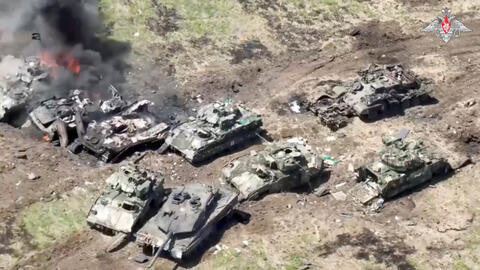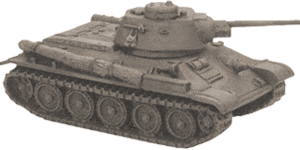Russian-Ukrainian War Update: Make Peace, You Fools

By July of 1944 (with the Allied success of D-Day coupled with the even bigger Soviet success of Bagration) it was obvious Germany had lost the Second World War. The German military commander-in-chief of the western front was Field Marshal Gerd von Rundstedt. By that point in the war Rundstedt had acquired a reputation for saying and doing what he saw fit, regardless of the consequences.
So, perhaps it was no surprise that on July 1, 1944 he bluntly informed Field Marshal Wilhelm Keitel (the head of the German armed forces high command - OKW) that they had no choice but to make peace (variously quoted as "Make peace, you fools!" or "End the War, you idiots!"). Needless to say, that didn't happen. Rundstedt was benched (replaced by Field Marshal Gunther von Kluge), and Germany was obliterated during the ten months that followed. Because of the German leadership's failure to accept the inevitable, several million people lost their lives for no good reason whatsoever.
Fast forward to today. In February of 2022 Russia invaded the Ukraine - seeking to end the long simmering conflict that had been dragging on since 2014. To the credit of the Ukrainian armed forces, they managed to survive the initial Russian blitz (in hindsight overly optimistic in its goals given the paucity of forces assigned to Russia's "special military operation"). But the cost to the Ukrainians was enormous. The combination of Ukrainian losses and Russia's need to level-up for a larger war led to an attritional bloodbath, mostly centered on the Donbas. There, the first Ukrainian defensive lines were largely breached during the spring of 2022. But that wasn't nearly enough for the still under-resourced Russian forces to claim victory in the Donbas.
In fact, the Ukrainians were able to take advantage of inadequate Russian force levels to counter. This led to a general Russian retreat east of Kharkov, and from the western bank of the Dnieper River (albeit while the Ukrainian army again took heavy losses to Russian air-power and artillery) Since then, the Russians rearmed and requipped. Meanwhile, a combination of mercenaries, militia, convicts, and regular forces spent the better part of a year aiming the Russian campaign at the key Donbas city of Bakhmut. In May 2023 the Russians finished taking that objective, inflicting enormous casualties on the Ukrainian army in the process.
Some might question my belief that the Russians are killing far more Ukrainians then they are in turn losing. However, the simple fact is that the Russians have imposing advantages in long-ranged firepower (artillery, rockets, missiles, and airpower). That is one reason (among others) why I belive the Russians are killing, disabling, or seriously wounding as many as six to nine Ukrainians for each man they lose in turn. One must remember that during conventional warfare between peer competitors artillery tends to inflict anywhere from 60-70% of all battlefield casualties. Given the Russian forces have been firing as much as 60,000 rounds per day (with a floor of maybe 15,000 rounds on slower days) against Ukrainian ammunition expenditures that average anywhere from approximately 5,000-6,000 rounds per day, and given Russia's huge advantages in electronic and drone warfare to target that artillery; one can see that there is no way the Ukrainians are coming close to giving as well as they are getting.
None of which is to diminish the Ukrainian effort. Just about any other army in the world likely would have collapsed by now in the face of firepower advantages such as that enjoyed by the Russians. Even more impressively, while everything else was going on the Ukrainians spent the first five months of 2023 building up a reserve of nearly one dozen brigades (trained and equipped by NATO). Each brigade consisted of anywhere from 2,500-4,000 men, with maybe a battalion or two of armored fighting vehicles per unit (instead of the 5,000 plus men and more ample quantities of equipment they were supposed to field). Though under-manned and equipped this Corps sized force had been painstakingly assembled to target the Russian held land-bridge to the Crimea (located in the southern Ukraine just north of the sea of Azov). The NATO/Ukrainian belief being that if the Ukrainian Army could thrust south to the sea of Azov, they could then turn the tide against the Russians.
The long awaited Ukrainian counter-offensive began during June's first week, and since then has gone absolutely nowhere - all while taking truly massive losses. Conservative estimates are that as many as 30,000-40,000 Ukrainian soldiers have been killed in action, no less those disabled or otherwise seriously wounded. Hundreds of armored fighting vehicles representing some of NATO's last readily available stocks of tanks, infantry fighting vehicles, mine-breaching vehicles, and self-propelled artillery have been destroyed (the image above is of destroyed Ukrainian armor - NATO and U.S. supplied Leopard MBT's and Bradley IFV's). The Ukrainian counter-offensive has, of the time of this writing, not even reached the first Russian defensive line, and is largely spent.
The majority of the blame for this defeat should be reserved for those Ukrainian and NATO generals who planned this debacle. They knew the Ukrainians lacked the artillery, air-power, short-ranged air defense, and other such assets to form a combined arms force capable of breaching Russia's lines. Worse yet, everyone knew where the counter-offensive would be directed. This gave the Russians months to prepare a Kursk like defense, which the Ukrainians subsequently beat themselves bloody against.
Meanwhile, the Russian army is stronger than at any point in the past quarter century. It is veteran, poorly performing officers have been turfed out, and its ranks are swelling with new recruits receiving far more extensive training than their Ukrainian foes. It is also increasingly well equipped. Add in the existing Russian advantages in engineers, armor, artillery, air-power, missiles, drone warfare, air defense, electronic warfare, and we are now looking at an army nearly ready to do whatever it wants in the Ukraine. The Ukrainian leadership (and their U.S. handlers) would thus do well to consider the advice Rundstedt gave his German high command nearly 80 years ago when confronting a similarly bleak chance of not just achieving victory, but merely surviving as an independent nation-state.



Post new comment